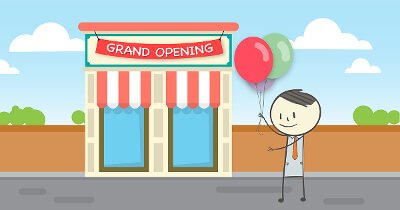Turning Your Idea into a Business

Once you have an idea for a small business, you may wonder, what's the next step?
If you're eligible for Social Security's Ticket to Work (Ticket) program, a Ticket program service provider may be able to help you get started! We talked with Colleen Moynihan at the New England Business Associates (NEBA), and learned about the first steps of starting a business. As the program director for the Business Center for Self-Employment at NEBA, Colleen is responsible for program development, managing NEBA's Ticket program and working with people who are eligible for the Ticket program and interested in pursuing self-employment.
Colleen has worked with a variety of entrepreneurs who have pursued self-employment in independent contracting for research, social media management, lawn maintenance and landscaping, writing, inventors whose patented ideas are used in a variety of industries, and more. Today, we share some of Colleen's guidance about turning your idea into a business.
Once someone has a business idea, what's the first thing they should do?
"When I work with someone, the first thing I like to discuss is what their hopes and dreams are for their business idea. And then I can advise them of the direction they can go," Colleen says. "The first question I typically ask them is 'Why are you doing a business plan?' and most of them will say that they were told that it was a good idea. My goal is to help them think bigger and broader with what they want to do and what they'd like their business to achieve."
What's the second thing that someone should do
before opening a business?
Once you establish the bigger and broader goal of your business, you may be ready to start your business plan.
"We use the SCORE business plan outline," Colleen says, "because that's the standard for the business world and it comes from the Small Business Administration."
Colleen and other employees at NEBA help people working toward self-employment create the business plan, too.
"The first thing I need to know is: Is this a viable business idea?" Colleen said.
She says that they ask Ticketholders to tell them about their business — how it got started and where they plan for it to go — to help determine if the business is both viable and feasible.
"They have to demonstrate in our first 3 sessions that they can explain what their business is. We try to meld their idea of a service or a product and start looking at what they have to do to have that idea or service become a business."
After this, Colleen says that they spend some time on looking at the financials. "We use a very basic financials spreadsheet, especially since for most people we work with, this is the first time they're trying to start a business," she said. "We usually start with talking about financials in parallel with the business narrative because that's where the real story is and where we can discuss the costs. So, the first 2 things that any business should think about are how much money you want to make – or have to make – and what your operating costs are."
What role can a mentor play for someone who's starting their own business?
"When someone writes a business plan, it's sort of like a toolkit. Now, you may remember when you were younger and your father or someone gave you your first hammer or your first screwdriver. He had to show you how to use it properly. Someone has to show you how to use [the] tools in your business plan toolkit", says Colleen. This, she agrees, is where a mentor steps in. "NEBA makes the commitment to stay with that person for up to 3 years to help guide them. But also, wherever we can, we connect them with a SCORE mentor – because that's what SCORE is there for. They're not people who assist in writing a plan as much as assist with implementing the plan and guiding a person through the development of the business.
"Studies have shown that an individual starting a business with a mentor has an 80% success rate, whereas a person who doesn't have a mentor only has a 30% success rate."
Colleen also recognizes the benefit of having someone who's going through the same experiences to talk with.
"I try to connect my [Ticket to Work clients] if I think they'll offer good peer support to each other. I was talking with someone who does a gourmet service and she had run into some problems with social media. I have another person who's a whiz-kid on social media, so I connected those two to help the first person to get her users and social media numbers. Many times they're not selling the same thing, but they have the same problems and can help each other."
WISE up on self-employment supports
If you're interested in learning more about how the Ticket program may help you pursue your goal of opening your own business, our next Work Incentives Seminar Event (WISE) webinar, can help!
Colleen will join us as one of our presenters and will discuss how ENs, like NEBA, support people eligible for the Ticket program pursue self-employment. Register now to learn about working with a Ticket program service provider and Social Security Work Incentives that may help you during the transition to opening your business and earning income.
We'll also talk about work-from-home job opportunities. Join us to learn about telework as a reasonable accommodation, finding work-from-home jobs, and supports available as you make the transition to working and earning income!